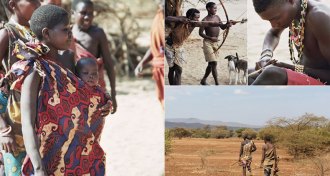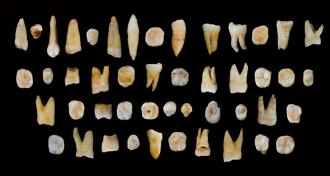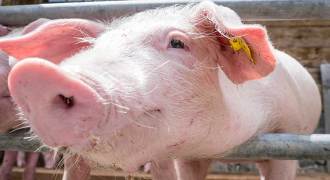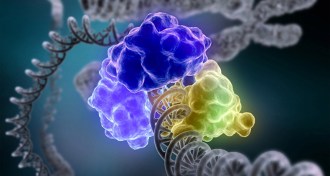News
-
 Anthropology
AnthropologySleep time in hunter-gatherer groups on low end of scale
Hunter-gatherer communities in Africa and South America have similar sleeping patterns as people living in postindustrial societies, researchers find.
-
 Neuroscience
NeuroscienceAdolescent brains open to change
Adolescent brains are still changing, a malleability that renders them particularly sensitive to the outside world.
-
 Anthropology
AnthropologyLong before going to Europe, humans ventured east to Asia
Cave finds indicate modern humans reached southern China long before entering Europe.
By Bruce Bower -
 Environment
EnvironmentAir pollutants enter body through skin
Although scientists have largely viewed skin as an unimportant portal to blood for toxic air pollutants, new human data show that skin can surpass lungs as a route of entry.
By Janet Raloff -
 Genetics
GeneticsGene editing makes pigs safer for human transplants
CRISPR/Cas9 disables multiple viruses at one time
-
 Quantum Physics
Quantum PhysicsFuture quantum computing could exploit old technology
Silicon transistors have been modified and patched together to form logic gates that could perform calculations in future quantum computers.
By Andrew Grant -
 Oceans
OceansOxygen in Black Sea has declined by more than a third since 1955
The Black Sea’s oxygen-rich surface layer shrank by more than a third from 1955 through 2013, compressing marine habitats and bringing toxic hydrogen sulfide closer to the surface.
-
 Genetics
GeneticsChemical tags on DNA appear to differ between gay and straight men
DNA marks distinguished homosexual men from heterosexual men with in a small twin study.
-
 Humans
HumansInto Africa: Ancient skeleton sheds light on reverse migration
Ancient man’s DNA helps reveal extent of Eurasian farmers’ back-to-Africa migration some 3,000 years ago.
By Bruce Bower -
 Science & Society
Science & SocietyNobels note neutrinos, DNA, drugs
The Nobel Prizes in physics, chemistry and physiology or medicine ran the gamut this year, honoring both fundamental science discoveries and research with real-world impacts.
-
 Chemistry
ChemistryChemistry Nobel granted for deciphering DNA repair
Three researchers win chemistry Nobel for working out how cells fix damaged genetic material
By Meghan Rosen and Sarah Schwartz -
 Animals
AnimalsOldest pregnant horselike fossil found
A 48-million-year-old fossil of an early horse and fetus is the oldest and best-preserved specimen of its kind.